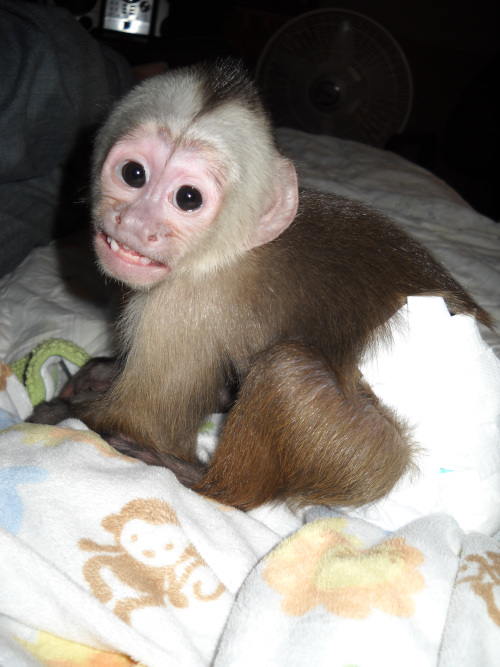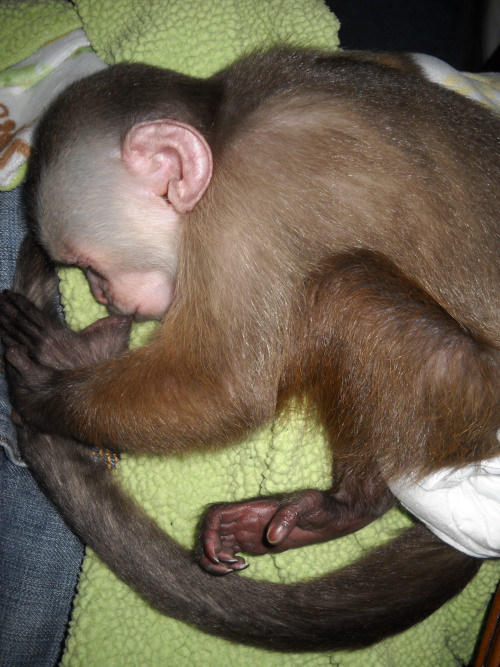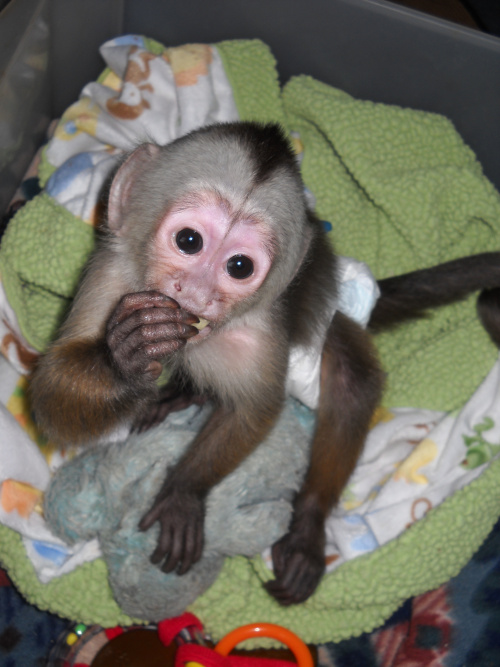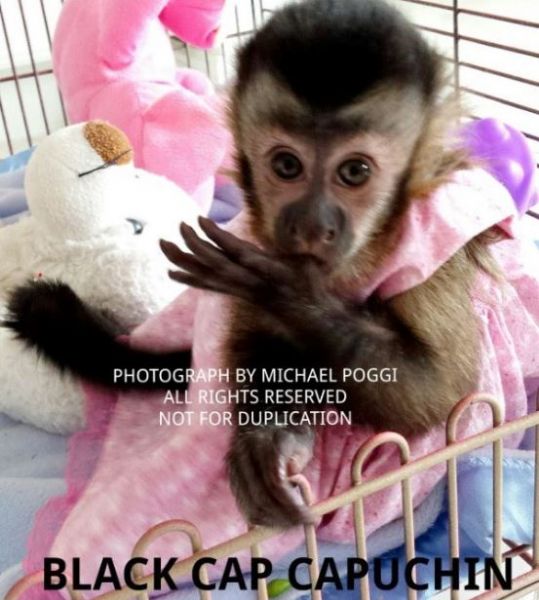Capuchin Monkeys for Sale
Let us help you find your next baby capuchin monkey, but before doing, let's make sure that you're ready for this lifelong commitment. Capuchins are unpredictable, expensive, destructive, and require a lot of care and attention. They're social animals that can live up to 45 years, so if you're not home all the time, you'll need to buy a companion monkey. While you can travel with your monkey when they're just a baby, that will no longer be possible once they get older since it is near impossible to find a monkey sitter. It can also be very challenging to find a vet in your area willing to handle your capuchins. In many cases, expect to drive up to 4 hours to find a vet that specializes in primate care.
So why would anybody still want a baby capuchin monkey after reading all this? Because capuchins are one of the most intriguing primate species. They're very intelligent and love playing for hours. While they can be mischievous, they're smart enough to know when they did something wrong and will gladly trade a cuddle to get away with whatever they just did. Before searching for capuchin monkeys for sale, make sure to do plenty of research.



Baby capuchin monkeys can be expensive, let's go over the most commonly asked questions by people looking to buy a baby capuchin monkey as a pet.
How much does a capuchin monkey cost?
Where can I find a free capuchin monkey rehome?
Can I sell my capuchin monkey for a rehome fee?
Why are capuchin monkeys popular pets?
Can I potty train a capuchin monkey?
Do capuchin monkeys bite?
Do capuchin monkeys and kids mix?
Should I get my baby capuchin monkey from a breeder or broker?
Is it legal to keep a capuchin as a pet monkey?
Can capuchin monkeys get diabetes?
What should I feed my capuchin monkeys?
How much does a capuchin monkey cost?
Prices for baby capuchin monkeys vary greatly and are often sold for over $12,000.00. A hand-reared capuchin will obviously be more expensive than a parent raised capuchin. Parent raised capuchins will be more challenging to handle from day one. If you find capuchin monkeys for sale at a much lower price, these ads are most likely a scam or you are purchasing a rehome or ex-breeder monkey. We do not advice first-time primate owners to ever get an older capuchin monkey since they often come with a lot of challenges.
It is not that uncommon for breeders to request a deposit but make sure you have proof of that deposit. A lot of first-time owners get scammed online. Remember, in the USA you must have USDA license before you are permitted to sell a primate. Ask for proof of that license before submitting payment. We also recommend that future primate owners pick up their capuchin at the breeder/broker. If your monkey is getting shipped, make sure the person shipping your monkey has the proper licenses to do so.
While purchasing your baby capuchin is expensive, their care can't be underestimated. In the first year your capuchin will want to spend a lot of their time clinging to your body. Besides the amount of time you'll need to spend with your baby capuchin, you'll need to buy lots of enrichment toys and a large indoor and preferably outdoor enclosure in the future. You'll also have ongoing vet expenses and they require a diet that mainly consists of fresh vegetables and commercial primate biscuits. You can expect their daily diet to cost around $5.00 per day.
Since capuchin monkeys can live up to 45 years, make sure to do your research prior to obtaining a baby capuchin monkey because they are a lifelong commitment.
Visit our Monkeys For Sale page to find capuchin monkeys for sale in your area.
Where can I find a free capuchin monkey rehome?
A lot of people reach out to us wondering if there isn't an older free capuchin monkey out there that they can adopt. They tell us they've always wanted a monkey but never really could afford one and have a hole in their heart that needs to be filled.
Capuchins for sale are expensive but so is their care. While free rehomes do become available from time the time, the chance for a first-time primate owner to adopt a capuchin monkey is very slim and not advisable. Don't forget, the reason why people rehome an animal is in many cases because they have a hard time handling their primate in the first case. Unless you have a lot of experience with primates, you'll have a hard time understanding their body language and you will most likely end up getting hurt. People that rehome their capuchin often still have a strong bond with their capuchin and will want what is best for their primate, so they nearly always reach out to more experienced primate owners to adopt their capuchin.
If you ever see an ad for a free rehome, those are always scams where the scammer will require you to pay some type of rehome fee which is illegal unless you have an USDA license or one time permit. Remember, if something sounds too good to be true, it most likely is.
Can I sell my capuchin monkey for a rehome fee?
In the USA you are not allowed to sell your pet capuchin monkey for a fee unless you have an USDA breeder or broker license. If you're unable to take care of your monkey and you want to sell them to recuperate some of your costs, you'll need to contact the USDA to obtain an one time permit which will allow you to sell your capuchin.
Selling your monkey without that permit is against the law and could get you in trouble. You are always allowed to give your monkey away for free but no rehome or any other type of fee can be charged without that permit.
Rehoming monkeys can be quite traumatic for both the owner and your capuchin monkey so please make sure to find the right candidate to take care of your monkey. A rehome should never go to a first-time owner.
Why are capuchin monkeys popular pets?
Out of all primate species, capuchin monkeys are most commonly kept as exotic pets. Due to their intelligence and smaller size, people seem to prefer them above most other primate species. Capuchin monkeys are often used in movies since they can be trained more easily than other new world primates. Don't get me wrong, only an experienced trainer will be able to teach your monkey a lot of cool tricks.
While they can be very challenging to keep as pets, the fact that they are so much like us makes them very attractive. Just like us, they have 10 fingers and toes and they often use their tail as a 5th arm to grab or hold on to objects. They'll let you know when they're not happy but a simple hug from them makes you forget all about those challenging moments.
Amongst all capuchin species, the most commonly kept species is the black-capped capuchin (cebus appella) followed by the white-faced capuchin (cebus capucinus). Most experience primate owners claim that black caps are more docile than any of the other capuchin species. Whether you should get a male or a female capuchin varies from whomever you ask. Some prefer males because they seem more playful while others prefer females because they seem more reserved. Females are typically a bit smaller than males. Getting them spayed or neutered within the first year helps curb their aggression once they reach maturity which is between 4-5 years old.
Can I potty train a capuchin monkey?
It is near impossible to potty train a capuchin monkey or any primate for that matter. While you might be able to train them on command, they'll still use the bathroom whenever they need to go and wherever they want to go.
Most primate owners diaper train their capuchin monkey which is very easy to do if you started to diaper them from when they were a baby. To prevent capuchins from digging in their diapers, a diaper cover is often used to keep your monkey clean.
We allow our capuchins to roam free within their enclosures without a diaper, but they know they won't be allowed to get out until they've got their diaper, diaper cover, and short leash on for safety. They'll actually end up holding their short leash with their own tail when they run around the house. Needless to say, certain areas in our house are monkey proof to prevent them from getting hurt.
Do capuchin monkeys bite?
All monkeys bite so that includes capuchin monkeys. Capuchins communicate through voice, body language and with their teeth.
To prevent from getting injured, you'll need to learn to understand their behavior so you can establish dominance over the troop. By doing so you'll be able to minimize your chances of getting injured by your capuchin.
Once they get older, it is often more challenging to allow your primate to interact with strangers. Dora, our capuchin rehome, can be such a sweet monkey with me, but doesn't allow others to interact with her. Truth is, we don't allow visitors to touch any of our capuchins as a safety measure.
Do capuchin monkeys and kids mix?
In short, they don't but let's go into a bit more detail about why not. When capuchin monkeys are babies you won't experience any issues when they interract with your kids. However, once they reach maturity, they will want to establish dominance over your kids which will end up in injury.
The only way you can keep a monkey when you have kids is to keep them separated which in many cases will end up causing resentment from your child in the first place. Let's be honest, capuchins are very social animals so you'll need to spend a lot of time with them which in most cases will make your child jealous. We see this over and over again and in nearly all instances this will end up in a rehome.
While we know of several people that have capuchins and kids, they all agree that monkeys and kids truly don't mix very well. Our advice and theirs is to wait until your kids are fully grown and out of the house before you buy a capuchin monkey as a pet.
Should I get my baby capuchin monkey from a breeder or broker?
While many people seem to prefer to obtain baby capuchins for sale from a breeder directly, in the end it all depends on the reliability of that breeder or broker. Before getting your monkey from any breeder or broker, get feedback from current owners through social media groups to see what their experience was with a particular breeder or broker.
Whomever you end up buying your baby capuchin monkey from, make sure they have an USDA license that is current. Nobody within the USA can sell you a primate without a valid USDA license and that includes rehomes being sold at a fee.
Is it legal to keep a capuchin as a pet monkey?
Unless you want your monkey to be taken away from you, make sure to find out if you're even allowed to keep a capuchin monkey where you currently live.
A lot of states have rules and regulations in place in regard to primate ownership. In some states primate ownership might be completely illegal, while other states or cities limit the ownership to new world primates, like capuchins, only. Either way, contact the USDA to find out if you're allowed to even keep a capuchin monkey in your state.
Once you know it is legal to keep a capuchin monkey in your state, you'll need to find out if the county you live in has any ordinances against primate ownership.
As a last step you'll need to find out if your city and county has any restrictions in place regarding primate ownership. Even though it might be legal to own a primate in your state, when you're within city limits, you're in many cases not permitted to keep a capuchin monkey on your property. If you live within city limits, contact your city clerk to find out what ordinances are in place in regard to primate ownership.
Can capuchin monkeys get diabetes?
Diabetes with capuchin monkeys, and especially capuchins monkeys kept as pets, is fairly common but can in most cases be prevented. We also see diabetic capuchin monkeys at zoos but since their diets are typically less sugary and they live in groups so they're more active, the number of diabetic capuchin monkeys is much lower.
Since capuchin monkeys are so prone to develop diabetes, it is important to keep them on a very healthy diet. Avoid sugary snacks and that includes too much fruit. Only small amounts of fruit should be fed to them. They should be on a high protein diet that mainly consists of vegetables, boiled eggs, insects (like mealworms), nuts/seeds, and monkey biscuits.
Besides their diet, another very common reason for them to develop diabetes is the lack of excercise. Make sure your capuchin(s) have access to an outdoor enclosure and keep them busy with enrichment devices during the day. Many pet capuchins are overweight because they're either eating too much, or they're not getting enough exercise. If needed, limit their food intake and work on developing an enrichment program.
Concerned that your capuchin might have developed diabetes? Besides doing a urine test, the most effective way to test whether or not your capuchin has developed diabetes is through a blood test. Your vet will need to draw blood which will allow them to test their glucose levels. For capuchins, the glucose levels should be between 44 and 94. Higher levels can be detected if your capuchin is stressed. On the day of the vet visit, your capuchin be fed 8 hours prior to the visit.
If your capuchin has developed diabetes, you'll need to give them insulin shots which can of course be very challenging. You'll need to work with your monkey to present their arm, leg, or tail to give them an insulin shot in exchange for a treat. This won't be easy which is why it is so important to keep them on a healthy high protein diet to prevent diabetes in the first place.
What should I feed my capuchin monkey?
Capuchins are omnivorous. In the wild capuchins feed on fruits, nuts/seeds, berries, insects, lizards, rodents and small birds.
Since pet capuchin monkeys are prone to diabetes, it is important to feed them a high protein / low sugary diet. Wild jungle fruit has much more fiber, more protein, and a much lower sugar content than what we buy at the store. Also, in the wild monkeys have to forage for food all day and burn a lot of calories doing so, which is something that doesn't happen when food gets readily presented in their food dish. It is one of the reasons why zoos often try to make their monkeys work for their food because exercise is just as important as a healthy diet.
While it is ok to give your capuchin a few small pieces of fruit (like blueberries) a day, fruit should only be a small part of their diet. Their diet should mainly consists of fresh vegetables (like lettuce, spinach, broccoli, green beans, sweet potato, zucchini squash), boiled eggs, insects (like mealworms), raw nuts/seeds (in the shell for extra enrichment when possible), and commercial primate biscuits. You should feed your capuchins 2 to 3 times a day while making sure they have access to fresh water at all times. If possible, give them access to a water dish since capuchins love to soak their food and especially their biscuits.
We always have Capuchins For Sale at our monkeys for sale page.
